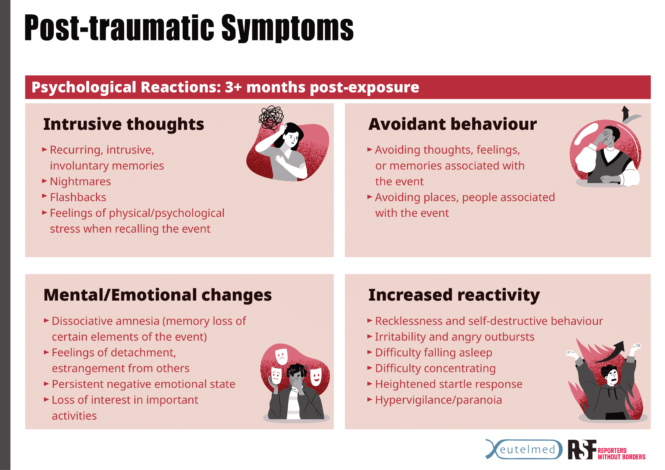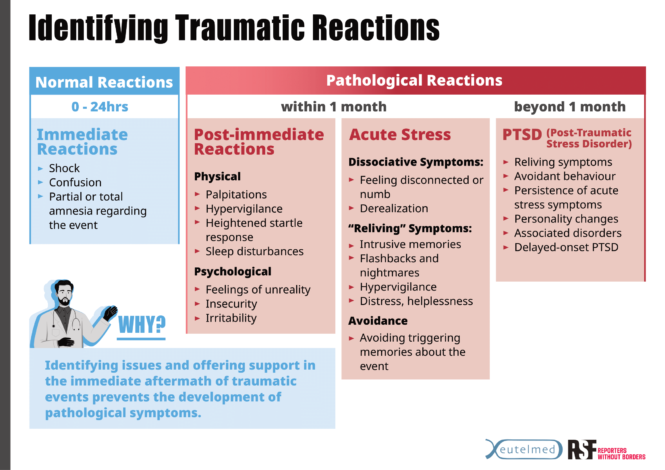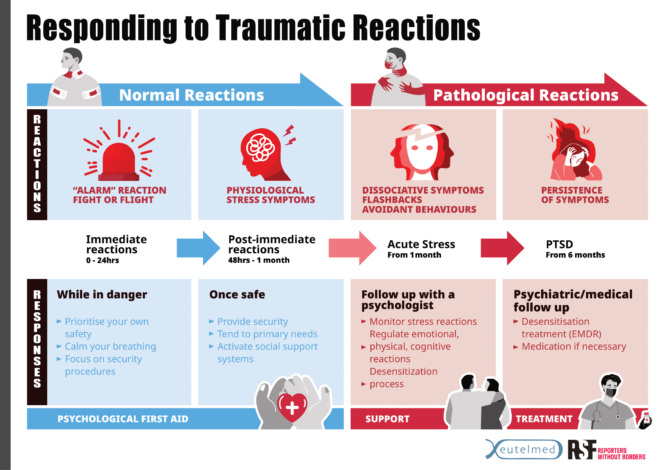The trauma experienced by journalists during their work can lead to lasting mental and physical health issues. It is important for journalists to understand the signs of trauma so that they can adequately respond to them.
Journalists bear witness to disaster, suffering, and acts of violence on the job. They hear accounts and view images which can be highly distressing, and often risk their personal safety and freedom to perform their jobs. All these experiences can lead to a range of mental or physical responses in the following days and months, which can greatly differ from one person to another.
Short-term trauma responses
In the first 24 hours after a traumatic experience, it is normal to feel shaky, light-headed, or nauseous. You may be in a state of shock or confusion, or suffer from temporary amnesia and may be unable to remember the event clearly. Within these first 24 hours, your priority should be your own safety. During the initial “fight-or-flight” stage, you should try to remain calm and focus on security procedures.
Once in a safer situation, you should apply psychological first aid, and tend to the primary needs: food, water, sleep, security, and social support. Reach out to trusted people and accept support to ease the burden on your own body and mind.
Long-term traumatic reactions
Initial stress responses generally pass over time but you could still present long-term traumatic reactions.
Acute Stress Disorder (ASD)
During the first month following a traumatic event, look out for signs of acute stress disorder (ASD), such as anxiety or paranoia. ASD symptoms also include:
- Intrusive memories: distressing mental images that intrude one’s mind involuntarily;
- Sleep deprivation and nightmares;
- Heart palpitations;
- Irritability: exhaustion, paranoia, and pathological stress leading to angry outbursts;
- Feeling numb or disconnected from reality.
In some cases, ASD can strongly affect one’s personal and professional life. It can even lead to social withdrawal as people become avoidant to any activities that could trigger memories of the traumatic event they witnessed.
Post-traumatic stress disorder (PTSD)
Post-traumatic stress disorder (PTSD) is characterised by acute stress symptoms similar to ASD but that last longer than a month. Continued post-traumatic symptoms can be very distressing, and may impact a journalist’s social life, sleep schedule, their ability to think clearly in high-stress environments and to process upsetting information.
PTSD symptoms include:
- Sleep deprivation and reliance on sleeping aids (alcohol, sleeping pills);
- Dissociative amnesia: partial memory loss of the event or repressed memories;
- Depression: persistent negative emotional state, difficulty in maintaining self-care, loss of interest in important activities, feeling detached from people;
- Hypervigilance: paranoia, constantly being on alert despite the lack of danger;
- Self-destructive behaviour, driven by feelings of lack of control or an impaired sense of danger.
Untreated PTSD can result in dramatic personality changes. People can develop anxiety and panic disorders, alcohol or drug abuse problems, eating disorders, obsessive compulsive disorder (OCD), dissociative disorders, and suicidal thoughts.
If you think you may be experiencing PTSD, seek professional help from a doctor or psychiatrist as symptoms can be long-lasting and may severely impact your mental wellbeing.
Resources to respond to traumatic reactions
Learning how to regulate emotional and physical reactions can be a difficult process, and individuals differ greatly in how they manage their trauma. Remember that you do not have to suffer alone. There are resources specifically directed toward journalists experiencing ASD or PTSD:
- RSF’s Safety Guide chapter 6, section 10: “Psychological Trauma: Managing Traumatic Stress”.
- Dart Center’s Journo Trauma Handbook pages 10-17: “Reporting Trauma – The Journalist”.
- Find A Helpline: a searchable index of mental health and suicide helplines worldwide. They provide links to chat-, text-, and call-based crisis lines for various countries and specified needs including trauma, depression and anxiety, abuse, addiction, self-harm, grief and more.
Eutelmed, an international telemedicine platform with a focus on emotional and mental health, offers secure online medical consultation services, with healthcare professionals of a range of cultures and specialties including stress, trauma, grief, and many others.



Slides available in PDF here.



